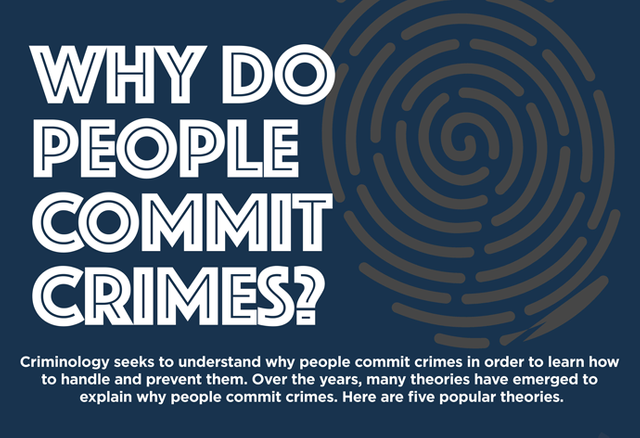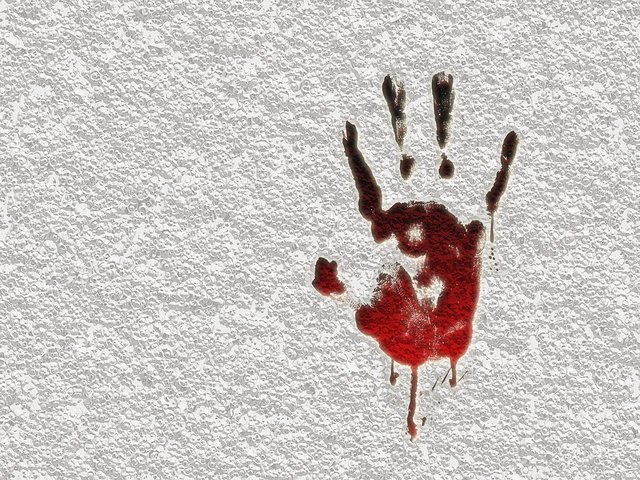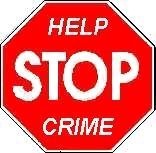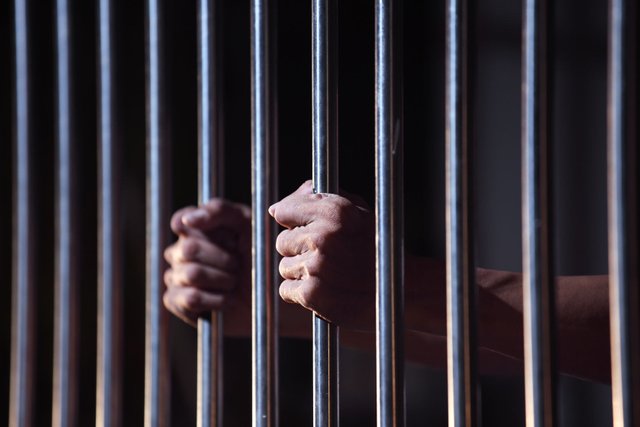IF YOU DO THE CRIME, THEN WHY NOT THE TIME.

Early this morning I was watching a crime documentary, on a gripping true-life story of passion and murder, it's actually one of the most terrifying true-life crime stories I've ever seen,it was rated most terrifying crime stories of our time! through series of analysis carried out on it, I got to learn a few things about Criminal psychology.
Also, Criminological psychology, this is basically the study of the wills, thoughts, intentions, and reactions of criminals/offenders and all that partakes in crime,this studies goes deeply into what makes someone commit a crime, but also the reactions after the crime, on the run or in court. Analyzing the impact of crime on victims, the society, humanity, no reason is logical enough to commit a crime, - any crime committed is one crime too much and when found guilty should do the time.
What is crime?
The Oxford Dictionary of Sociology defines crime in a more complex way: ‘an offence which goes beyond the personal and into the public sphere breaking prohibitory rules or laws, to which legitimate punishments or sanctions are attached, and which requires the intervention of a public authority.’ Social norms and values help to determine what is legally defined as crime: judges and law-makers are influenced by these norms and values when they define what crime is, and make recommendations about suitable punishments. But social norms and values change over time, and are different in each country. This means the acts or behaviours that are considered to be criminal also change over time. Society’s view of crime can also change with time; for example, Prohibition, Homosexuality, and more recently, Cyber crimes. Moreover, there are many other reasons why certain acts are criminalised while others aren’t, So we may do something 'wrong' that is not a crime. Lying to a friend may be wrong but it may not be a crime. On the other hand we may do something 'right' which is a crime. So, a crime is a fact, a matter of law. It is not an opinion.
Types of crime
Rape and sexual assault
Revenge porn
Revenge porn is when someone shares sexually explicit images or videos of another person without their consent.
Robbery
A robbery is when someone takes something from you with violence or threats – usually (but not always) in the street or another public place.
Sexual harassment
What is sexual harassment?
Sexual harassment is any kind of unwanted behaviour of a sexual nature that makes you feel humiliated or intimidated, or that creates a hostile environment.
Stalking and harassment
Stalking is persistent and unwanted attention that makes you feel pestered and harassed.
Murder-Suicide: When Killing Yourself Isn’t Enough
Terrorism
Terrorist attacks are sudden and unpredictable and generally calculated to create a climate of fear or terror among the public. A terror attack can lead to an ongoing feeling of insecurity.
Violent crime
A violent crime is when someone physically hurts or threatens to hurt someone, and also includes crimes where a weapon is used.
Antisocial behaviour
Antisocial behaviour is when you feel intimidated or distressed by a person's behaviour towards you.
Arson
Arson is when someone deliberately sets fire to someone else's property to damage it or to injure people.
Burglary
A burglary is when someone breaks into a building with the intention of stealing, hurting someone or committing unlawful damage.
Childhood abuse
Child abuse can happen in different ways, and can include neglect as well as physical, emotional and sexual abuse.
Cyber crime
The term cyber crime refers to a variety of crimes carried out online.
Domestic abuse
Domestic abuse describes negative behaviours that one person exhibits over another within families or relationships.
Fraud
Fraud is when someone tricks or deceives you to gain a dishonest advantage.
Hate crime
Hate crime is the term used to describe an incident or crime against someone based on a part of their identity.
Murder or manslaughter
Bereavement is a painful experience for anyone, but when you lose someone because of the violent actions of another person – through murder or manslaughter – it can be particularly devastating.

The causes of crime are complex. Most people today accept that poverty, parental neglect, low self-esteem, bad government policies, frustration, depression, bad temperaments, greed, relationship insecurities, alcohol and drug abuse are all connected in explaining why people commit crimes. Some people are simply at greater risk of becoming offenders because of the circumstances into which they are born.
There is little doubt that some commit a crime such as shoplifting out of desperation, especially when food is concerned. Yet the same crime also attracts the attention of organised gangs who steal to order and cost stores hundreds of millions each year. The same crime but carried for different motives; one for survival, the other to make as much money as possible for as little work as possible.
Various people have forwarded theories to explain why some people became offenders.
Yochelson and Samenow put forward the theory of free will to explain criminal behaviour. This has five points to it:
• 1. The roots of criminality lie in the way people think and make their decisions.
• 2. Criminals think and act differently than other people, even from a very young age.
• 3. Criminals are, by nature, irresponsible, impulsive, self-centred, and driven by fear and anger.
• 4. Deterministic explanations of crime result from believing the criminal who is seeking sympathy.
• 5. Crime occurs because the criminal wills it or chooses it, and it is this choice they make that rehabilitation must deal with.
According to Albert Bandura’s theory, delinquent and criminal behaviour is learned via the same psychological processes as any other behaviour: through learned and repeated exposure to rewards (reinforcements) that support the behaviour. On the flip side, behaviours that received no support or negative reactions are not learned and therefore will not recur. Bandura believes that people observe others’ behaviours and decide whether or not to adopt them.
Freud identified the “pleasure principle”; that humans have basic unconscious biological urges and a desire for immediate gratification and satisfaction. This includes desires for food, sex, and survival. Freud believed that if these could not be acquired legally, people would instinctively try to do so illegally. Freud also believed that people have the ability to learn in early childhood what is right and what is wrong and though we may have an instinctive nature to acquire what we desire, such nature can be controlled by what is learned in our early years. He believed that people primarily get moral principles as a young child from their parents and that if these were missing because of poor parenting, that child would grow up into being less able to control natural urges to acquire whatever is needed.
The oldest known explanatory model of behaviour is that of demonology. It used to be thought that criminal behaviour was the result of a possessed mind and/or body and the only way to exorcise the evil was usually by some torturous means. The key was a focus on the individual rather than his or her environment or any social forces.
Social Structure Theory originating in Sociological Theory takes a different stance begging the question that if biologic factors explain crimes, then why does most crime take place in bad neighborhoods? Focal points of this theory are:
Urban conditions influence crime rates. Areas with high unemployment, low-performing and underfunded schools, or citizens with low socioeconomic status are more likely to produce criminals.
Conflict arises between people’s goals and the means used to obtain them. Criminals take whichever approach is easier regardless of its legality.
Criminal behavior is an expression of conformity to lower-class subculture values and traditions; it is not a rebellion against traditional society as some would think.

IMPACT OF CRIME
On Victims
The trauma of victimization can have a profound and devastating impact on crime victims and their loved ones. It can alter the victim’s view of the world as a just place and leave victims with new and difficult feelings and reactions that they may not understand.
Crime has significant, yet varying consequences, on individual crime victims, their families and friends, and communities. The impact of crime on victims results in emotional and psychological, physical, financial, social and spiritual consequences.
•Physiological anxiety (including rapid heart
rate,hyperventilation, and stomach distress)
•Physical injuries (such as gunshot wounds,
lacerations, broken bones, sprains, and
burns)Physical injuries that lead to other health conditions (such as heart attack, stroke, fractures from falling, and loss of dexterity)Increased risk of cardiac distress, irritable bowel syndrome, and chronic pain
•Permanent disability •Disfigurement
•Immune disorders that increase the potential for infectious diseases •Substantial lifestyle changes, including restriction of activities once enjoyed
•Lethargy and body fatigue
•Sleep disorders
•Loss of appetite, excessive appetite, or eating disorders
• Decreased libido and sexual dysfunction
• Inability to work
• Increased risk of future victimization
•For sexual assault victims: possible exposure to sexually transmitted diseases, exposure to HIV, and unwanted pregnancy and many more
On Communities
Crime has an impact not only on primary and secondary victims but also on the entire community. High-profile major crimes, such as school shootings or multiple-victim molestations understandably will have an impact on all community members. Other crimes, such as kidnappings, sexual assaults, or drunk driving crashes, can also have a wide effect. Some communities have begun to use community victim impact statements to assess the effect of crime. Similar to individual victim impact statements, these statements can be introduced after conviction to assist the judge in sentencing.
On the Society
Crime not only leads to material and immaterial costs for those who have become victimised, but crime also forces local and national authorities to spend millions on the prevention of crime and the detection, prosecution and punishment of offenders, feeding of inmates.
On a macro-economic level crime influences:
economic growth;
•Income;
•Labour force participation;
•Income spent on security measures; and
reallocation of resources creating uncertainty and inefficiency.
On a more local and regional level, economists define the following types of impact:
•Business impact (crime reduces competitiveness of companies and investments)
•Tourism impact
•Impact on quality of life/social capital
•Impact on property value

On a more general view, crime is usually committed due to desperation and a need for things that can’t be attained under normal circumstances.
When offenders breach such a moral limit, they are liable to do anything without a regard for the consequences. This is very dangerous, for when someone has a “nothing to lose” attitude, they lose the sense of reason.
Also, there is an increase in snatch theft, its important to keep cool and to be a loser, when confronted with a snatch theft or robbery situation. Its better to give up your money and iPhone and be alive than to be a dead hero.
Finally, Our ability to reason is what makes us different from the other species on this planet, otherwise we’re no better than animals. Accessing the impact of crime on it's victims, the community and the society as a whole, should be reason enough not to go into crime, for an individual with sane moral ethics, but rather that's not the case. Ultimately if someone chooses to commit a crime, that is their responsibility. If caught, the individual should pay the consequences. I only want to leave one thought - any crime committed is one crime too much, and due consequences should be reward. Stay away from crime, think Right, earn right!
Don't do the crime if you can't do the time.
